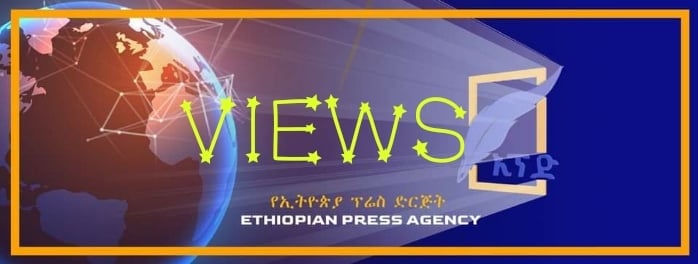
The election being a possible turn to the worse – be it fullfledged civil war or complete state collapse – is an apprehension shared by both who suggest it with implied intentions and genuine concerns. Given the escalating ethno-religious tension that was fumed by foreign and domestic forces over the past decades – and more intensively the past three years – the fear of the election being a watershed to a darker path is quite understandable.
However, if analyzed objectively, such a threat is not as much as the anti-election propagandas suggests – especially after the arrest of the erratic political and crisis entrepreneur Jawar Mohammed and Co., and the demise of the TPLF terrorists. The recent horrendous civilian attack targeting ethnic Amharas in Benishangul and Wollega by OLF “Shene” [the alleged military wing of Dawud Ibsa’s OLF] was committed with the intent to escalate public outrage and frustration against Abiy Ahmed’s administration – and to mount domestic and international pressure on the government to cancel the upcoming election.
Such a move was allegedly backed by foreign forces such as Egypt, Sudan, and their western backers – all having their own agenda ranging from blocking the second filling of the dam to stopping China and Russia in Africa.
Now that the government has managed to control it somehow, the important question here is what are the real threats in sight that could turn the upcoming election into an existential threat to Ethiopia? The possible threats as I see it are either pre or post election crisis that could possibly be instigated by local extremists whose greed for power is at all time high, and fueled up by foreign forces who intend to overthrow Abiy Ahmed’s regime for various reasons. One way or another, they are aimed at delegitimizing the election – and thereby the probable winner – Abiy Ahmed. The extremists have realized that election is not the right path for them to grab power – while the foreign forces believe Abiy Ahmed’s regime is unfriendly towards them thereby posing a challenge against their national interests in the HOA.
The pre-election crisis may happen in many shapes and forms. It may be the continuation of the targeted massacres of ethnic Amharas in Benishangul and Oromia [or even other places]with the intent to radicalise the Amhara people and fume Amhara nationalism – significantly eroding the foundations of Ethiopian nationalism and escalating public outrage and mistrust against Abiy Ahmed and/or the upcoming election. This might extend to public protests in Amhara and other areas – with a possibility to turn violent if hijacked by extremist agendas.
We might also witness a border conflict between different ethnic groups – such as Somalis and Afars – to intensify the security crisis in the country. TPLF might also continue to commit domestic terror attacks in different towns and cities of Tigray to worsen the humanitarian situation in the region, and thereby sustain the undue diplomatic pressure on the Ethiopian government.
Likewise, the ethno nationalist extremists might demand the release of their ‘political leaders’ before the election and organize violence especially in Oromia or might instigate the killing of an Oromo public figure to catalyse violence against other ethnic civilians [as has been witnessed after the murder of the popular Oromo artist – Hachalu Hundessa]. Such a crisis will seriously undermine the election and the federal government – especially if it is to happen in Oromia, where the federal and the regional government itself allegedly have limited influence when it comes to the lower bureaucratic structure – be it in the civil and security administration. In this sense, the election might be political fallout for Abiy Ahmed and Oromia Prosperity party as the biggest gamble for him is to win the majority vote from his home state of Oromia – especially in places like Arisi, Bale, Harerge – whose major population is Islam that backs Jawar Mohammed’s “dream” of building a free nation of Oromia through Islamization [Islamic Caliphate State of Oromia]. It shall also be noted that these are the major places where we have seen heinous crimes and violence against non-Oromo civilians (and Christian Oromos) taking place since Abiy came to power. The possibility of foreign aggression be it from Egypt and Sudan, or the western powers [under the guise of humanitarian intervention on Tigray Crisis] must also not be dismissed recklessly.
Whether or not Ethiopia manages to conduct the election by preventing or properly managing pre-election crises, there still is a possibility of a post-election crisis that could possibly arise depending on the outcome of the election. However, post election violence has now been a common feature of non-western democracies [esp. African], Ethiopia having her own set of experience in this regard [2005 post election violence]. However, if the government succeeds in preventing or properly managing the pre-election crisis with the contemporary national security apparatus, there is a high possibility of it preventing or managing post election violence – diminishing the very threat it poses against Ethiopia’s national interest in every front. But that doesn’t mean that it could not be intensified through the implicit and explicit foreign players that are carefully watching the events unfolding in Ethiopia and the Horn of Africa.
In conclusion, there is a possibility of a pre and post election crisis, but not as much as exaggerated by the western governments, media, institutions, and the ethno-religious extremists in Ethiopia. Having said that, the government should carefully assess the potential risks and possible measures it can take either to fully prevent or minimize the seriousness of the threat against national sovereignty and public wellbeing. However, in the event the government fails to do so, the election might actually be a turn to the worst in Ethiopia’s modern political history.
Pre and Post Election Crisis: Between Democratic Rights and Democratic Wrongs
The international community and the power mongering domestic ‘politicians’ and ‘activists’ have repeatedly called for the Ethiopian government to cancel the upcoming election and consider the establishment of a transitional government – with the inclusion of TPLF and other domestic terrorists. In an effort to justify their demand, they present exaggerated political and security assessments of Ethiopia stating there is a very high risk of inter-ethnic/religious violence that could lead to state collapse or disintegration. While one can logically understand the risks and consider the request for extension of election [while the current government retains power] justifiable – calling for the overall cancellation of the election and forming a transitional government signals the existence of implied intent.
While the domestic campaigners for transitional government targets power positions through a shortcut, the international actors are probably hoping to remove Abiy, and install a puppet gov’t – be it TPLF or any other ethno nationalist that could best serve their interest.
Careful analysis of the behavior and political history of the parties that claims to be included in the transitional government – and the intent and diplomatic history of the foreign powers backing them – will only solidify the assertion that the idea of transitional government has less to do with Ethiopia’s national interest, and more to do with the personal/national interest of its advocates. Thus, holding elections with all due precautions is more in favor of Ethiopia’s long term and short term interest, than negotiating with domestic terrorists and unprincipled self-centered political entrepreneurs to form a transitional government that will possibly do more damage to Ethiopia – than the election itself. Most importantly, a transitional government with the current proposed members will not resolve the deep rooted socio political and economic challenges that require a unanimous determination and focused reforms – or even revolution.
However, there are various precautionary and rectifying measures both the public and the government adopted and should further adopt to prevent or manage pre and post election crisis as related to the upcoming election – in order to make sure the juncture it brings for Ethiopia will only lead the nation towards democracy, stability and prosperity. For instance, the National Election Board, under the leadership of the prominent lawyer & former opposition member [of TPLF led EPRDF regime] Birtukan Mideksa, has invited national and international observers, civil society organizations (CSOs), and other state and non-state actors to observe the election and help ensure the integrity of the electoral processes and institutions. The government has also designed relatively efficient legal and institutional frameworks that are fit-for-purpose, as compared to the past 5 sham elections held during the TPLF regime. This will help entrench resilience to negative political interferences, fraud, mismanagement, violence and acts of impunity. The government has also repeatedly demonstrated the relative impartiality and capacity of electoral authorities to deliver without undermining the integrity of electoral processes and institutions – by installing personnel with proper knowledge and skills, good management practices, technical and logistical capacities, and/or sufficient funding. In addition, the board has also facilitated informed engagement of electoral stakeholders, both political parties and voters, in the electoral processes in order to ensure inclusiveness and participation of the election – thereby paving the way towards the legitimacy of the outcome, and those who are to hold public office post election.
That being said, the government has to enhance the capacity and increased engagement of the intelligence and security sector to identify and properly address potential threats of violence – having a special focus on internal traitors, border conflicts, border cities facing irredentist claims from neighbouring states, domestic armed combatants, areas of frequent violence against civilians, arms trade and trafficking and so forth. However, careful prior analysis is required regarding the necessity and proportionality of use of force in cases of violent protests to simultaneously avoid risk of escalation – be it from lack of action or intensified reaction to a disproportional/illegitimate use of force. It also has to step up its game on the PR front – and work towards more transparency. The same work is needed on the diplomatic front – especially in terms of galvanizing the support of African nations and institutions in the face of growing undue political pressure from the western world with the intent to delegitimize the election [for their own agenda]. The government shall utilize state media and other communication mediums to enhance political stability and national unity in the face of an election – whose outcome might change the nation for the good or the bad.
And now that voter registration is closed with a significant number of voters already registered to vote, it is up to the Ethiopian people to make an informed decision – starting by choosing their information source carefully and educating themselves on important issues in Ethiopian politics. The public shall pay attention to what the government and the oppositions as well as the foreign powers are doing. They shall communicate with local communities and encourage others to vote. By all means, the people and the government shall work hand in hand to disrupt the dissemination of false and misleading information by ethno-religious extremist or foreign forces to cause pre and post election violence. The public shall also organize itself and volunteer on Election Day to conduct COVID patrol, peace/security patrol, assembly patrol in their respective constituencies. And finally, the Ethiopian people shall refrain from facilitating or participating in violent protests that pose existential threat to the country – regardless of the outcome of the election.
Concluding Remarks:
Ethiopia is as a nation transitioning from half a century of authoritarianism, tribalism (ethno religious tensions) and external political pressure (and conspiracy) – and yet preparing to conduct a general election in the face of a serious challenge to choose between the uphill battle to democracy and development, or the downhill path to violence and complete state collapse. Yet, it all depends on the efficiency of the government to predict, prevent and manage threats of pre and post election violence – and the support of both the national public [including political opponents] and the international community.
The upcoming elections may pose security challenges [like any other elections held in a transitional democracy – or autocracy] – but it is also highly likely to lead to greater success in the transition to substantive democracy as it paves the way for the seeds sowed through years of public struggle to blossom into democratic demands that cannot be ignored. It shall also be noted that the relative political openness of Abiy Ahmed’s administration to engage with political groups with conflicting agendas so far suggests the existence of high probability to become more democratic. Therefore, if all the noise against the conduct of this election is of genuine concern for democracy and security in Ethiopia, our ‘politicians’ and the international community shall refrain from unjustified critics and reckless commentaries – and support the Ethiopian government to exploit this election as a foundation for the country’s democratic future. So go ahead, support the vote, even if it’s not perfect.
Editor’s Note: The views entertained in this article do not necessarily reflect the stance of The Ethiopian Herald
BY BLEN M DIRIBA
The EthiopianHerald 20 June 2021



